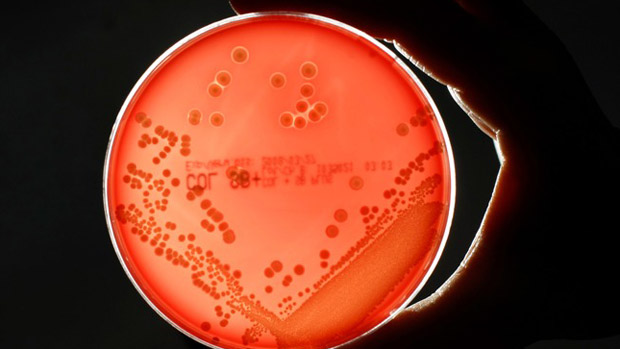How 'breakthrough' drug Staphefekt could replace antibiotics
Newly developed enzyme 'can kill superbugs' and will 'revolutionise' fight against antibiotic-resistant bacteria

A free daily email with the biggest news stories of the day – and the best features from TheWeek.com
You are now subscribed
Your newsletter sign-up was successful
Scientists believe they have developed a new drug that can treat antibiotic-resistant "superbugs" such as MRSA.
Staphefekt has been hailed as the first effective alternative to antibiotics and represents a major breakthrough in the fight against drug-resistant bacteria.
"The results are exciting, and demonstrate the potential this technology has to revolutionise the way we treat certain bacterial infections," said Bjorn Herpers, a clinical microbiologist responsible for testing the drug, the Daily Mail reports.
The Week
Escape your echo chamber. Get the facts behind the news, plus analysis from multiple perspectives.

Sign up for The Week's Free Newsletters
From our morning news briefing to a weekly Good News Newsletter, get the best of The Week delivered directly to your inbox.
From our morning news briefing to a weekly Good News Newsletter, get the best of The Week delivered directly to your inbox.
What is Staphefekt and how does it work?
The drug is based on a naturally occurring enzyme produced by viruses and attacks infections differently to antibiotics. Unlike antibiotics, it does not destroy the harmless bacteria that live in the body, which causes it to become drug resistant. In the study, the drug was proven to eliminate MRSA in five out of six patients with skin infections.
"Endolysins exist in nature, but we’ve made a modified version that combines the bit that is best at binding to the bacteria with another bit that is best at killing it," Herpers told The Times.
"As well as being less prone to resistance induction than antibiotics, endolysins (enzymes) destroy only their target bacterial species, leaving the beneficial bacteria alone," he explained.
A free daily email with the biggest news stories of the day – and the best features from TheWeek.com
Why do we need a replacement for antibiotics?
Healthcare experts have long been calling for an urgent reduction in the amount of antibiotics being prescribed, warning that their overuse is fuelling the rise in drug resistant bacteria. At least 5,000 deaths a year are linked to drug-resistant diseases.
Earlier this year, David Cameron warned that the spread of drug-resistant superbugs could take medicine "back to the dark ages". England’s chief medical officer Dame Sally Davies issued a similar warning, saying "apocalyptic" scenarios where relatively simple surgeries become fatal could become a reality.
What this development means
The use of these enzymes to treat bacterial infections has been explored by scientists for decades, but "what’s exciting is that they seem to have made it work," said Mark Woolhouse from the University of Edinburgh.
Researchers are hopeful that they will be able to develop a safe and effective version of the drug in pill or intravenous form within the next five years. Once fully developed, scientists believe it could also be used to treat other multidrug-resistant infections such as tuberculosis, gonorrhoea and E coli in the future.
Mark Offerhaus, chief executive of Micreos, the biotechnology company behind the drug, said the development marks "a new era in the fight against antibiotic-resistant bacteria."
"Millions of people stand to benefit. That’s very exciting and gratifying."
-
 How to navigate dating apps to find ‘the one’
How to navigate dating apps to find ‘the one’The Week Recommends Put an end to endless swiping and make real romantic connections
-
 Elon Musk’s pivot from Mars to the moon
Elon Musk’s pivot from Mars to the moonIn the Spotlight SpaceX shifts focus with IPO approaching
-
 ‘Hong Kong is stable because it has been muzzled’
‘Hong Kong is stable because it has been muzzled’Instant Opinion Opinion, comment and editorials of the day
-
 ‘The tide will turn against the Tories unless they build more homes’
‘The tide will turn against the Tories unless they build more homes’Instant Opinion Your digest of analysis and commentary from the British and international press
-
 ‘A society preoccupied with national symbols is an insecure one’
‘A society preoccupied with national symbols is an insecure one’Instant Opinion Your digest of analysis and commentary from the British and international press
-
 ‘The assumptions of postwar politics are crumbling’
‘The assumptions of postwar politics are crumbling’Instant Opinion Your digest of analysis and commentary from the British and international press
-
 ‘The UK government’s union problems are mounting on all fronts’
‘The UK government’s union problems are mounting on all fronts’Instant Opinion Your digest of analysis and commentary from the British and international press
-
 ‘Thousands of children in care are at risk due to Brexit’
‘Thousands of children in care are at risk due to Brexit’Instant Opinion Your digest of analysis and commentary from the British and international press
-
 Instant Opinion: Boomers should ‘take note’ of climate march
Instant Opinion: Boomers should ‘take note’ of climate marchIn Depth Your guide to the best columns and commentary on Friday 20 September
-
 Instant Opinion: ‘David Cameron is not the only one to blame for Brexit mess’
Instant Opinion: ‘David Cameron is not the only one to blame for Brexit mess’In Depth Your guide to the best columns and commentary on Thursday 19 September
-
 Pigeon poos on politician as he protests about pigeon poo
Pigeon poos on politician as he protests about pigeon pooSpeed Read And other stories from the stranger side of life